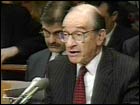
NEW YORK (CNN/Money) -
Federal Reserve Chairman Alan Greenspan reiterated his cautiously optimistic outlook for the U.S. economy in a speech Wednesday, saying again that the latest recession is apparently over but the size and shape of the recovery still are uncertain.
Greenspan, in prepared remarks delivered to the Independent Community Bankers of America, basically repeated the testimony he gave to the Senate Committee on Banking, Housing and Urban Affairs on March 7.
"In the past several months, we have seen increasing signs that some of the forces restraining the economy over the past year are starting to diminish and that activity is beginning to firm," he said Wednesday.
As he did in his earlier speech, Greenspan pointed to the efforts of U.S. businesses to reduce inventories as a main driver of economic recovery. A glut of unsold goods, the hangover of a spending boom in the late 1990s, led to a dramatic slowdown in production, a 19-month recession in manufacturing and more than a million job cuts. Once inventories are reduced, businesses will be free to increase production again.
"With production running well below sales, the lift to income and spending from the inevitable cessation of inventory liquidation could be significant," Greenspan said.

But he also repeated his warning that final demand would need to continue to rise in order to fuel a prolonged rally in production. Though saying there have been "encouraging signs" of such demand increasing lately, "the dimensions of the pickup remain uncertain."
Greenspan also pointed out that the economy will not likely get a boost from a surge in consumer spending, since consumers managed to spend throughout the downturn, helping the economy avoid two straight quarters of shrinking gross domestic product (GDP).
"The broad contours of the present cycle have been, and will continue to be, driven by the evolution of corporate profits and capital investment," he said. "On balance, the recovery in spending on business fixed investment is likely to be only gradual."
In order to keep consumers spending despite a recession that some economists think began in March 2001, the Fed cut its target for short-term interest rates 11 times in 2001. It decided at its first meeting in 2002 to leave rates alone, and Greenspan's comments and recent positive economic data have convinced many economists that it could soon adopt a neutral bias, meaning it no longer thinks the economy is in danger of shrinking. Fed policy makers could take that stance as soon as their next meeting, scheduled for March 19.
U.S. stock prices, already dragged lower by relatively disappointing February retail sales data released Wednesday morning, extended their losses after Greenspan spoke. Treasury bond prices rose.

|

